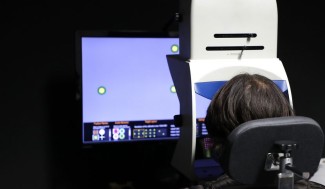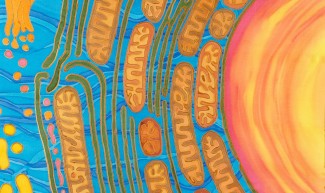In everyday life, we all need to anticipate our actions. On the road, for example, we need to start or cross when the light turns green. While the light is red, our brain prepares to act as quickly as possible as soon as the color changes because we are "trained" and know how to evaluate the duration of the light.
However, sometimes we start or cross before the light turns green. Is this behavior impulsivity or an alteration of anticipation?
An innovative study using eye movement recording
Pierre POUGET, CNRS researcher from the Paris Brain institute and Bertrand DEGOS, neurologist APHP, from the team " MOV'IT : Movement, investigations, therapeutics. Normal and abnormal movement: physiopathology and experimental therapeutics" in collaboration with Marcus MISSAL from the Institute of Neurosciences of Leuven (Belgium) have for the first time, thanks to an innovative technique, been able to distinguish the difference between a lack of motor inhibition which leads to impulsivity and an alteration of anticipation.
Their work consisted in recording eye movements, or saccades, in 20 patients with Parkinson's disease, treated or not, and in 18 healthy volunteers.
For example, eye movements are now used to distinguish Parkinson's patients from those with progressive supranuclear palsy (PSP), an atypical Parkinson's syndrome, which is characterized by very slow vertical eye movements.
Although Parkinson's disease is characterized by slowness and reduced occurrence of intentional movements, increased motor impulsivity and decreased anticipation related to impaired temporal perception, i.e., decreased ability to estimate the duration of an event, are sometimes observed.
The study consisted in recording the speed and the correct temporality of the participants' eye movements when a luminous point appeared on a screen, always at the same place.
Two conditions were analyzed, the first where the participants did not know when the signal would appear (implicit condition) and the second where an alert signal announced the appearance of the light point with more or less delay (explicit condition).
Parkinson's disease increases impulsivity and decreases anticipation capacity
The results show that untreated Parkinson's patients have a higher motor impulsivity than healthy volunteers and a lower anticipatory capacity. On the other hand, a decrease in impulsivity and an increase in anticipation were observed in patients treated with Levodopa, the usual treatment for the disease.
Areas of application beyond Parkinson's disease
Beyond the diagnosis and prognosis of Parkinson's disease, these results pave the way to better understand and assess motor impulsivity in diseases such as Tourette's syndrome but also in non-pathological conditions such as fatigue.
Sources
https://pubmed.ncbi.nlm.nih.gov/36184657/
Degos B, Pouget P, Missal M. From anticipation to impulsivity in Parkinson’s disease. NPJ Parkinsons Dis. 2022 Oct 3;8(1):125. doi: 10.1038/s41531-022-00393-w. PMID: 36184657; PMCID: PMC9527232.







